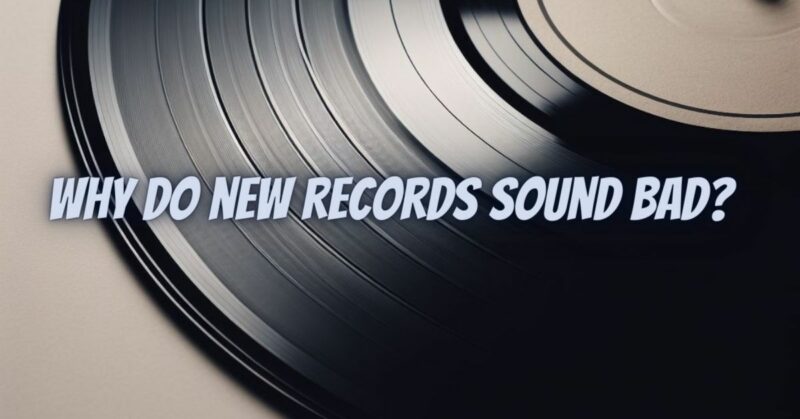here are a number of reasons why new records can sound bad. Some of the most common causes include:
- Poor pressing quality: New records are often pressed on low-quality vinyl using inferior pressing equipment. This can lead to a number of problems, such as surface noise, distortion, and non-fill.
- Poor mastering: New records are often poorly mastered. This can lead to a number of problems, such as a muddy soundstage, clipping, and lack of dynamics.
- Damage: New records can be damaged during shipping or storage. This can lead to surface noise, skipping, and other playback problems.
Here is a more detailed look at each of these causes:
Poor pressing quality
Vinyl records are made by pressing a heated disc of vinyl onto a metal stamper. The stamper is a negative image of the record grooves. The quality of the stamper can have a significant impact on the sound quality of the record.
Low-quality stampers can produce records with surface noise, distortion, and non-fill. Surface noise is caused by dust and other particles that are trapped in the vinyl grooves. Distortion is caused by the stylus dragging on the record grooves. Non-fill is a condition in which the vinyl does not completely fill the record grooves.
Poor mastering
Mastering is the process of preparing a recording for release. It involves adjusting the levels of the different instruments and vocals, as well as adding effects such as equalization and compression.
Poor mastering can lead to a number of problems, such as a muddy soundstage, clipping, and lack of dynamics. A muddy soundstage is a condition in which the different instruments and vocals are not clearly separated. Clipping is a condition in which the audio signal is too loud and the peaks of the waveform are flattened. Lack of dynamics is a condition in which the difference between the loudest and softest sounds in the recording is too small.
Damage
New records can be damaged during shipping or storage. This can lead to surface noise, skipping, and other playback problems.
Surface noise can be caused by dust and other particles that are deposited on the record surface. Skipping can be caused by scratches or other imperfections in the record grooves.
How to avoid buying new records that sound bad
There are a few things you can do to avoid buying new records that sound bad:
- Buy from reputable retailers. Reputable retailers are more likely to carry records that are pressed on high-quality vinyl using good pressing equipment.
- Inspect the record before you buy it. Look for any signs of damage, such as scratches or warping.
- Read reviews of the pressing before you buy it. There are a number of websites where you can read reviews of vinyl pressings.
If you are still unsure about the quality of a record, you can always buy it from a retailer that has a good return policy.
What to do if you buy a new record that sounds bad
If you buy a new record that sounds bad, there are a few things you can do:
- Return the record to the retailer. Reputable retailers will often refund or exchange records that are defective.
- Try cleaning the record. A clean record is less likely to produce surface noise and skipping.
- Try playing the record on a different turntable. It is possible that your turntable is not properly set up or that it has a faulty cartridge or stylus.
If you have tried all of these things and the record still sounds bad, you may need to replace it.


